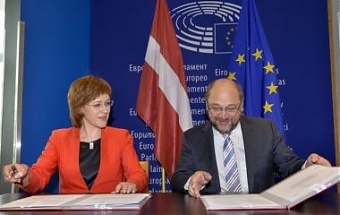Employment, EU – Baltic States, Financial Services, Latvia, Legislation, Markets and Companies
International Internet Magazine. Baltic States news & analytics
Tuesday, 23.04.2024, 10:11
EU Member States will be able to receive larger advance payments for implementation of the Youth Employment Initiative
 Print version
Print version |
|---|
| Zanda Kalnina-Lukasevica and Martin Schulz. Photo: eu2015.lv |
Already this year, the Youth Employment Initiative will have access to one billion euro to accelerate the launching of the planned Youth Guarantee schemes as part of this initiative and the reduction of unemployment among persons under 25 years of age in EU Member States. The amount of advance payments originally allocated for this year was €67 million.
Zanda Kalnina-Lukasevica also took part in the European Parliament’s plenary discussion on the effectiveness and results of the Youth Employment Initiative.
“Youth unemployment in a number of Member States still remains high, and its reduction is one of the priorities for the EU Council. Youth unemployment has a negative impact both on the young generation’s professional lives and on national economies in general,” Zanda Kalnina-Lukasevica stressed.
She also pointed out that Latvia started the implementation of the Youth Guarantee scheme in January 2014, and the first results are already there: last year, youth unemployment was reduced by 3.8% (it was 19.6% in 2014). The EU average youth unemployment rates for 2014 were 21.3%.
The regulation signed today envisages raising the pre-financing rate of the Youth Employment Initiative allocations from 1–1.5% to 30%. Member States can receive one third of the total funding immediately after they have adopted their action programmes. The funding is targeted at countries most affected by youth unemployment: Belgium, Bulgaria, Croatia, the Czech Republic, France, Greece, Hungary, Italy, Ireland, Latvia, Lithuania, Poland, Portugal, Romania, Slovakia, Slovenia, Spain, Sweden, and the United Kingdom.
The proposal for the regulation had to be approved by both legislators: the EU Council (Member State ministers) did that on 19 May, while the European Parliament voted for the proposal on 29 April.








 «The Baltic Course» Is Sold and Stays in Business!
«The Baltic Course» Is Sold and Stays in Business!

